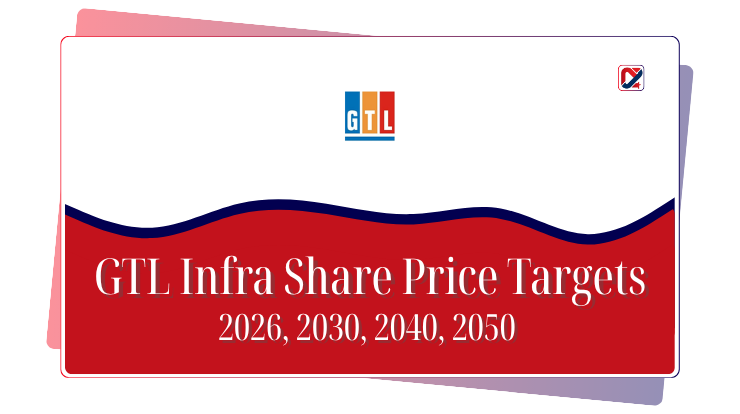Join WhatsApp Group
Join NowReliance Power Limited (RPower), established in 1995 and part of the Reliance ADA Group, is engaged in electricity generation through coal, gas, and renewable sources. Once considered a major private power producer in India, the company has faced financial distress over the last decade due to high leverage, slow project execution, and fluctuating fuel costs.
Despite challenges, the company has made progress in debt restructuring and operational efficiency. With India’s energy sector expanding rapidly, RPower’s large asset base and future renewable plans position it for gradual revival.
This article explores the company’s fundamentals, financial performance, and scenario-based share price targets through 2050.
Table of Contents
Company Overview
Reliance Power operates across multiple energy segments:
- Thermal Power: Major plants include Sasan Ultra Mega Power Project (Madhya Pradesh) and Butibori Thermal Power Project (Maharashtra).
- Hydropower: Several small and medium hydro projects are under development.
- Renewables: Exploring solar and wind energy opportunities for diversification.
Headquarters: Mumbai, Maharashtra
Parent Group: Reliance ADA Group
Key Assets: Sasan (3,960 MW), Rosa (1,200 MW), Butibori (600 MW)
The company’s installed generation capacity exceeds 5,900 MW.
Current Financial & Operational Metrics (FY25 Estimates)
| Metric | FY24 | FY25 (Est.) | Trend |
|---|---|---|---|
| Revenue | ₹7,200 crore | ₹7,800 crore | Slight growth |
| Net Profit/Loss | -₹350 crore | -₹150 crore | Losses narrowing |
| Debt | ₹1,800 crore | ₹1,600 crore | Gradual reduction |
| ROE | Negative | Improving | Debt restructuring benefits |
| Market Cap | ~₹8,000 crore | Increasing | Investor sentiment improving |
While Reliance Power continues to face profitability challenges, reduced losses and steady cash flows indicate gradual stabilisation.
Key Growth Drivers
- India’s Power Demand Boom: Rising industrial and residential electricity consumption supports higher utilisation.
- Debt Restructuring: Lower interest costs and repayment extensions are improving financial health.
- Asset Monetisation: Sale or restructuring of non-core assets to improve liquidity.
- Renewable Entry: Plans to diversify into solar and hybrid power generation.
- Strategic Partnerships: Collaborations with global and domestic firms for green energy projects.
Major Risks & Challenges
- High Debt Burden: Though reduced, leverage remains a major constraint.
- Legacy Projects: Coal-based plants face policy and sustainability headwinds.
- Limited Profitability: Margins remain under pressure from high input costs.
- Regulatory Challenges: Tariffs and environmental regulations could impact future projects.
- Group-Level Uncertainty: Financial challenges in the parent group can affect credibility and capital raising.
Reliance Power Share Price Target Forecast
| Year | Bear Case | Base Case | Bull Case | Key Assumptions |
|---|---|---|---|---|
| 2026 | ₹25 | ₹35 | ₹50 | Debt reduction, stable operations |
| 2027 | ₹30 | ₹45 | ₹65 | Margins improve, partial turnaround |
| 2028 | ₹40 | ₹60 | ₹85 | Asset monetization, renewable expansion |
| 2030 | ₹55 | ₹90 | ₹130 | Sustained profitability and cash flow |
| 2040 | ₹100 | ₹180 | ₹300 | Diversified clean energy portfolio |
| 2050 | ₹150 | ₹300 | ₹500 | Mature renewable business, strong balance sheet |
Note: These targets are indicative and depend on multiple macro and company-specific factors.
Year-Wise Analysis
Reliance Power Share Price Target 2026
In 2026, a gradual recovery is expected as RPower continues debt reduction and stabilizes core operations. The base case share price target is around ₹35, supported by improved project efficiency.
Reliance Power Share Price Target 2027
By 2027, the company may achieve stronger cash flows from its thermal assets and early renewable investments. The base case target could reach ₹45, with bullish sentiment pushing it toward ₹65.
Reliance Power Share Price Target 2028
If renewable projects start contributing meaningfully, profitability could return. The base case target might touch ₹60, with further upside in favourable policy conditions.
Reliance Power Share Price Target 2030
By 2030, successful diversification and consistent profit generation could drive valuations to around ₹90 in the base case, marking a potential turnaround phase.
Reliance Power Share Price Target 2040
In the 2040s, RPower could evolve into a balanced energy company with both thermal and renewable portfolios. The base case outlook sits around ₹180.
Reliance Power Share Price Target 2050
By 2050, assuming strong execution, debt-free status, and leadership in renewable projects, the stock could reach between ₹300–₹500 in a bullish long-term scenario.
FAQs
1. What does Reliance Power Limited do?
It generates and distributes power through coal, gas, and renewable sources across India.
2. Is Reliance Power profitable now?
Not yet, but losses have narrowed in recent years due to debt reduction and operational efficiency.
3. What are the company’s key assets?
Major plants include Sasan (MP), Rosa (UP), and Butibori (MH).
4. What are the risks of investing in Reliance Power?
High debt, regulatory risks, and dependence on thermal energy are the main challenges.
5. Are these share price targets guaranteed?
No. These are educational estimates and not financial advice. Actual performance depends on market and company execution.
Conclusion
Reliance Power Limited stands at a crucial point in its long-term journey. After years of financial pressure, it’s slowly stabilising through debt reduction, operational improvements, and plans to shift toward renewable energy.
The road ahead will not be easy, but with India’s energy demand growing rapidly, RPower’s large asset base could become a strength if managed effectively. Investors should treat it as a high-risk, long-term turnaround story rather than a quick-growth stock.
Disclaimer: The share price targets mentioned above are estimates for educational purposes only and do not constitute investment advice.


